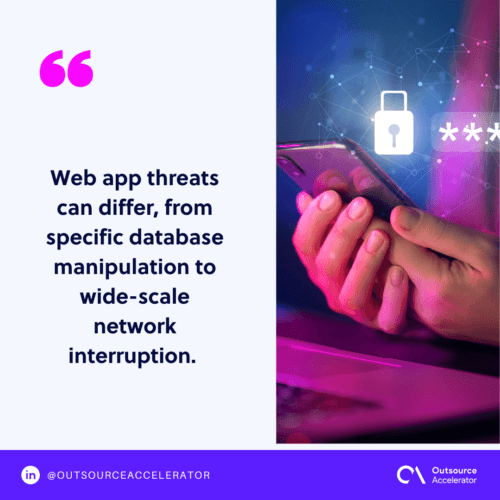Web security
Definition
What is web security?
Web security, often known as cybersecurity, refers to the protection of a website or web application against cyber threats by recognizing, avoiding, and dealing with them.
Websites and web applications are vulnerable to security breaches in the same way that physical houses, shops, and government buildings are. Cybercrime occurs daily, and strong web security precautions are required to keep them secure.
Web security can protect anything used through the internet. Most importantly, it prevents unauthorized individuals from accessing sensitive data on a website or online application.
What is a web security gateway?
A web security gateway protects companies from cyber threats by tracking and screening web traffic in real-time and blocking information considered suspicious or harmful by company policies.
Allocating the resources to inform the developer about new web security vulnerabilities and dangers is called a resource assignment.
The developer can receive a continuous and updated alert system that will assist them in detecting and eliminating any risks before they compromise security.
While web scanning is important for evaluating known vulnerability risks, detecting unknown threats can be even more difficult. That’s why it’s crucial to keep the alert system up to date.

Benefits of web security
Web security blocks access to certain sites that contain malware, fraud, and other dangers. It helps ensure data obtained online is safe and virus-free so that hackers can’t find a gateway into a user’s device.
Furthermore, it simplifies operations by administering security practices from a single, cloud-based panel and by implementing security policies consistently throughout the business.
Aside from safeguarding users against threats, web security can also increase employee awareness of internet activity. It can prevent users from viewing specific types of websites inappropriate for business use.
Common web security vulnerabilities
Web app threats can differ, from specific database manipulation to wide-scale network interruption. Here are some common web app security vulnerabilities:
Cross-site scripting (XSS)
XSS is one of the most common web security threats that allows attackers to put client-side scripts into a website. This allows them to access crucial data or manipulate the user and reveal personal information.
SQL injection (SQL)
SQL is used by attackers to expose weaknesses in a website’s authorization or authentication. They can then gain unauthorized access, change, generate, manipulate data, or, worse, delete confidential information.

Denial-of-service (DoS) and distributed denial-of-service (DDoS) attacks
Hackers can use a variety of channels to flood a single system with various types of network attacks. If a system can no longer handle incoming requests properly, it acts slowly and denies service to users’ incoming requests.
Buffer overflow
This web security vulnerability is an error that happens when software writes data to a designated memory area known as a buffer. When the buffer’s capacity is exceeded, neighboring memory areas are overwritten with data.
Cross-site request forgery (CSRF)
Cross-site request forgery is the technique of deceiving a user into initiating a request that uses their authentication or permission.
Once a user’s account has been hacked, the hacker can steal information, delete, or change confidential information. Accounts with high levels of authority, such as administrators or executives, are frequently targeted.
Data breach
In contrast to particular attack vectors, a data breach is a broad phrase that refers to the leak of sensitive or confidential information, which might happen maliciously or accidentally.
The range of what makes a data breach is extensive, ranging from a few extremely valuable documents to millions of compromised user accounts.







 Independent
Independent




